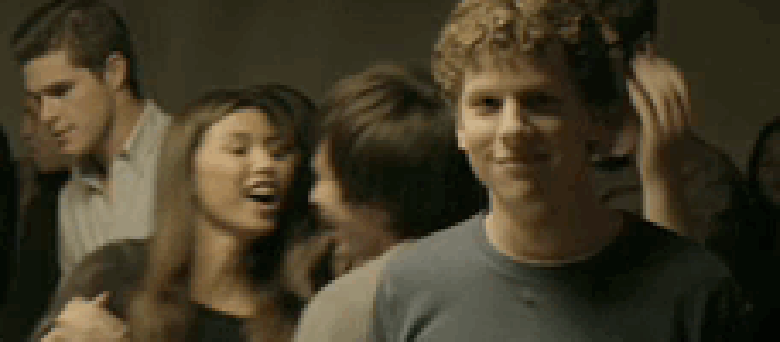Reviews
David Fincher
USA, 2010
Credits
Review by Rod Bastanmehr
Posted on 24 October 2010
Source 35mm print
Categories The 48th New York Film Festival
The Social Network is the kind of film that is so “about something” that it’s really about everything. That something is the creation of Facebook. That everything is the post-millennial existential dilemma: are we truly connected? Or, as Mark Zuckerberg asks in screenwriter Aaron Sorkin’s cold and flawless opening scene, “Is this real?” Many are entering The Social Network with the expectation of it “saying something” about us, about now, about everything that always happens and all the stuff that never seems to anymore. But what it really serves as is a stirring digital parable. What are we willing to sacrifice for everything? People? Even if the profit is the people?
It may be about new money and the young billionaires who made it, but The Social Network delivers an old message: people with power like to stay in power. But where films such as Citizen Kane or There Will Be Blood use their backdrops (the print industry and the oil boom, respectively) to better present their subjects’ internal decay, director David Fincher’s intentions lie elsewhere. Mark Zuckerberg’s creation isn’t just a meditation on his own disconnect — it’s a meditation on ours. This is a tale of power, but what grants the power is, here, connected to more than just the powerful. This is what makes Facebook interesting. This is what makes the film interesting.
Fincher has made a name as a pre-apocalyptic filmmaker. He gave us the post-capitalist wasteland of Fight Club and the horrors of the devout in Se7en. His work always hovers on the cusp of annihilation, chronicling the people who teeter most heavily. The Social Network may be his first foray into the shell-shocked days after social collapse. The End of Times, Fincher shows us, was started in a dorm room by a heartbroken boy in flannel and flip-flops. Jesse Eisenberg infuses Zuckerberg with just enough of himself to remind us that we were right to see something in him in the first place. This is the role Eisenberg was meant to embody, which usually means he won’t be able to escape it anytime soon. But why should he? Through him, Zuckerberg goes from begrudging geek to digital messiah in what feels like a nanosecond, and though we’re trained to hate the people that leave those who helped them behind, Eisenberg’s blank and fearful eyes give him soul, choice, an awareness.
But he has no heart. That organ is reserved for Eduardo Saverin, whose doe eyes are given life by British born Andrew Garfield. Garfield is the kind of understated talent that needs to be overshadowed in order to eventually be highlighted. He’s a whimper in a mosh pit. His gradual disillusionment — his ability to play naive and ignorant at once — is the perfect foil to Zuckerburg’s perfunctory meneuvers. When Eduardo gets punched (an Ivy League term meaning Sought Out By A Fraternity), he exudes pride and guilt simultaneously. He dreads a storm that he knows is brewing. And when Zuckerburg writes the achievement off coldly (“You should be happy if you don’t get any farther than this,” he snaps), Garfield waves his jealousy away. As Zuckerberg’s only friend, he is the man our hearts tug for. It’s his equation that puts Zuckerburg’s first project into action. It’s his investments that get The Facebook rolling. It’s his concern that shakes us initially. But he is devoid of imagination.
It’s Sean Parker, the co-creator of file sharing site Napster, who brings the Big Picture forth, and he is something of the villain. But he is an enticer, not an instigator. He dangles the power of the future in front of Zuckerberg, tapping into the excess that he so longs for. Parker was one of the first founders of the information age, and he knows the route we’re going. “We used to live on farms,” he blares, “then in cities, and now we live online.” Parker, a devil in a three-piece hoodie, is a visionary, but his vision is knowing what people want before they want it. He foresaw our digital immersion, the contradiction of wanting to be more easily connected but from a distance and through an artifice. But most importantly, he saw Zuckerberg’s real desire: not money, not respect, but the cool.
Timberlake is lifeless, delivering lines in the hopes that they qualify as acting. By and large he’s perhaps better than he needs to be, but not as good as the film thinks he is. Parker’s written as allure personified, a man who sees what Eduardo can’t. His imagination is his greatest strength: he foresees success. But Timberlake plays him like a con man with a credit card, using free drinks and cufflinks to sell himself as the person who should sell Facebook. So is he brilliant at business or at bullshit? Does the film want him to be clairvoyant or a con man?
Fincher’s strength is rhythm; Sorkin’s, pace. Together, they craft a film that flows. Fincher’s camera is always moving, and when it’s not, Eisenberg’s mouth is. Zuckerberg, an antihero whose apathy serves as a battle cry, was a man who didn’t understand the basics of human interaction, so he created an algorithm to explain it. He became a billionaire by digitizing relationships, and it all started because he couldn’t have one. The irony is obvious; the film doesn’t dabble in it too much. At times the film feels heavy-handed: an elongated rowing sequence, played to Grieg’s “In the Hall of the Mountain King,” all but shoves the pains of second-place down our throats. But when it’s confident, The Social Network follows in Zuckerberg’s indifferent shadow: there is nothing to learn here. Perhaps that’s because our current moment is so the direct result of Zuckerberg’s work that to preach a message would be to miss the point all together. And the point is this: we are all Zuckerberg, in one form or another. Sean Parker believed this; this is what makes him a villain. But Sean Parker was also right; this is what makes him complex.
Parker recognized Facebook as the 21st century’s great equalizer. It is, at its core, an exercise of a classic American philosophy: everyone has the same thing because everyone wants the same thing. What makes Facebook so crucial is that it taps into the basis of what we collectively desire, which is connection. Zuckerberg knew this better than the rest of us, so he did was what every computer does: he created a simulation. Director of photography Jeff Cronenweth knows this as well, so he drenches the film in iced hues, monochromatic and fiercely distant. That distance is rooted in the trauma that comes with simulation: that it’s a creation built on nothing but an idea. And this is the battle of the entire film: claiming ownership over the idea, receiving recognition for it. But Fincher recognizes this as the inherent flaw in what his characters are searching for. Zuckerberg is fighting for his idea, and is thus alienated when the rubble has cleared. All that’s left is the Facebook.
This is why the film’s final moment, with Zuckerberg sitting lonesome in a sky high office, pressing the refresh button on his own Facebook page, waiting to see if a friend he has just requested has added him back, is perhaps the film’s most overwhelmingly powerful. As his computer screen’s ambient hum fills in the silence left behind by Trent Reznor and Atticus Ross’s tense score, he presses refresh again. Then again. And again. The film continues onward, and its scope is simplified: this is a film about the technological space inhabited by flesh. It’s a shame then that its final seconds are interrupted by Paul McCartney cooing “Baby, You’re A Rich Man.” It leaves the moment feeling cynical when it should feel desolate. Irony be damned; Zuckerberg already is.
More The 48th New York Film Festival
We don’t do comments anymore, but you may contact us here or find us on Twitter or Facebook.





